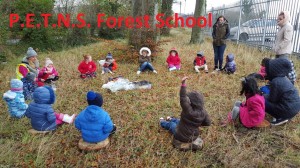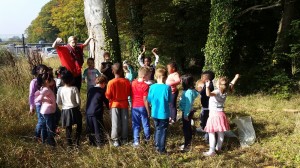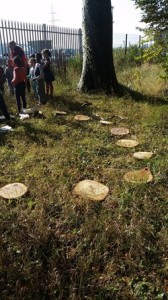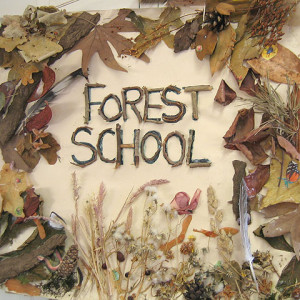 Powerstown ETNS is developing as a Forest School.
Powerstown ETNS is developing as a Forest School.
All children throughout the school have started engaging in the Forest School programme, co-ordinated by Maple class teacher. Emma Cleverley. You may have heard your child talking about going into the forest, doing a habitat study or identifying trees. This all part of the Forest School experience.
What is Forest School?
Forest School is an inspirational process, that offers ALL learners regular opportunities to achieve and develop confidence and self-esteem through hands-on learning experiences in a woodland or natural environment with trees.
Forest School is a specialised learning approach that sits within and compliments the wider context of outdoor and woodland education.
The ethos is shared by thousands of trained practitioners across Ireland, the UK and beyond. Its roots reach back to early years pioneers in outdoor learning and across the sea to Scandinavia.
 At Forest School all participants are viewed as:
At Forest School all participants are viewed as:
- equal, unique and valuable
- competent to explore & discover
- entitled to experience appropriate risk and challenge
- entitled to choose, and to initiate and drive their own learning and development
- entitled to experience regular success
- entitled to develop positive relationships with themselves and other people
- entitled to develop a strong, positive relationship with their natural world
This learner-centred approach interweaves with the ever-changing moods and marvels, potential and challenges of the natural world through the seasons to fill every Forest School session and programme with discovery and difference. Yet each programme does also share a common set of principles, aimed at ensuring that all learners experience the cumulative and lasting benefits that quality Forest School offers.
Full principles and criteria for good practice for Forest School
The growth in interest in Forest Schools has been phenomenal across the world. Mother Nature, it would appear is calling children back to here in their droves. And it’s not just Nature, educationalists and academics alike are discovering in our world of so-called connectedness we are not really connected until we rediscover our connection with nature. It is essential therefore that we adhere to the highest standards as set out by the FSA.
(Source: Forest School Association, UK)
- Forest School (FS) is a long-term process of frequent and regular sessions in a woodland or natural environment, rather than a one-off visit. Planning, adaptation, observations and reviewing are integral elements of FS.
- FS takes place in a woodland or natural wooded environment to support the development of a relationship between the learner and the natural world.
- FS aims to promote the holistic development of all those involved, fostering resilient, confident, independent and creative learners
- FS offers learners the opportunity to take supported risks appropriate to the environment and to themselves.
- FS is run by qualified Forest School practitioners who continuously maintain and develop their professional practice.
- FS uses a range of learner-centred processes to create a community for development and learning
You can read more information on these principles by clicking here.
Full principles and criteria for good practice for Forest School
The growth in interest in Forest Schools has been phenomenal across the world. Mother Nature, it would appear is calling children back to here in  their droves. And it’s not just Nature, educationalists and academics alike are discovering in our world of so-called connectedness we are not really connected until we rediscover our connection with nature. It is essential therefore that we adhere to the highest standards as set out by the FSA.
their droves. And it’s not just Nature, educationalists and academics alike are discovering in our world of so-called connectedness we are not really connected until we rediscover our connection with nature. It is essential therefore that we adhere to the highest standards as set out by the FSA.
(Source: Forest School Association, UK)
- Forest School (FS) is a long-term process of frequent and regular sessions in a woodland or natural environment, rather than a one-off visit. Planning, adaptation, observations and reviewing are integral elements of FS.
- FS takes place in a woodland or natural wooded environment to support the development of a relationship between the learner and the natural world.
- FS aims to promote the holistic development of all those involved, fostering resilient, confident, independent and creative learners
- FSoffers learners the opportunity to take supported risks appropriate to the environment and to themselves.
- FS is run by qualified Forest School practitioners who continuously maintain and develop their professional practice.
- FS uses a range of learner-centred processes to create a community for development and learning
You can read more information on these principles by clicking below. Forest Schools are set to become commonplace in Ireland over the coming years with training now available for forest school leaders and practitioners in Ireland. To find out about the next course follow the link below.

No responses yet